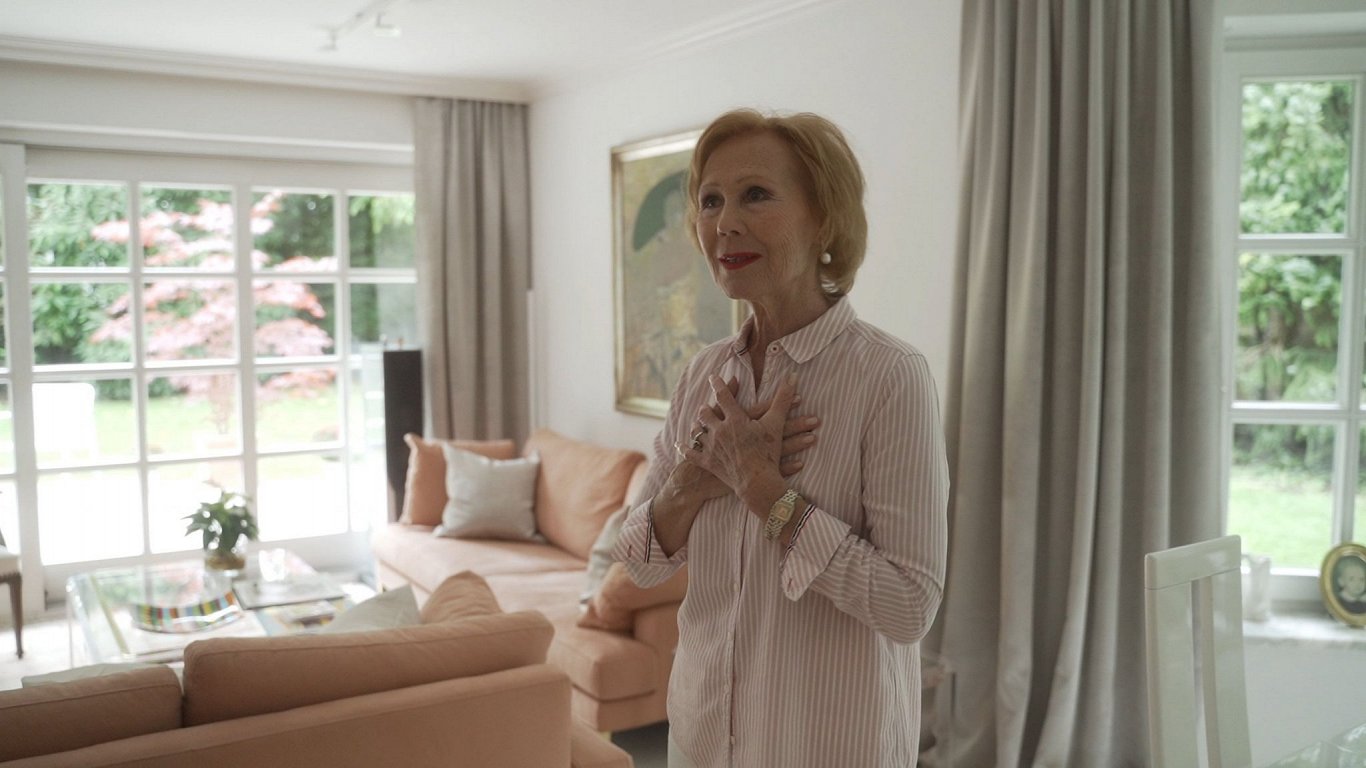It seems that this is also the case with the singer herself – a pop artist recognized both in Latvia and throughout the Soviet Union during the Soviet era: Mondrusa was among us and then – suddenly she was no more. There were no recordings, no public performances, there were only memories of a beautiful, well-groomed, sensual artist, of gorgeous, long elegant dresses, mini skirts and small caps, but she herself had become unwanted, unloved, to be found, – together with her husband, former Riga Estradas the artistic director of the orchestra (REO), the excellent musician Egil Schwartz – they had become enemies of the Soviet Union. Because: they had chosen to leave. Yes, yes – both have gone to the land of enemies of the Soviet ideology, to Federal Germany – it was whispered in all homes. Having gone to the land of “rotten capitalism”, the worst part of Germany, separated by a concrete wall – to the land where we all really wanted to go: if only for a moment to see how people live there, where shops are full of beautiful and tasty things, and where you can live a free life. But there was an iron curtain ahead.
But you won’t close the iron curtain for music, you won’t lock it with keys. Mondrus’s records spread from hand to hand, and it was her absence that conjured up the most romantic image: the singer seemed to be a little above the earth, on some cloud in the floral patterns of her beautiful dresses: with those poppies that she picks in foreign lands and with the roses that she holds In Germany, or anywhere else in the free world, plant. Listening to the banned records, it seemed that she was sitting there, right above the iron curtain, and that this cloud of dreams, which easily vibrates at every artistic gesture of Larisa, is so airy: it seems that one could fall through it. It is as incredible as the hope that something could change in Latvia one day:
“As a young child, I left my father long ago.
I only hear about it what is forgotten and ancient.
I plant roses in a foreign land,
I pluck pink poppies,
Although my thoughts often linger on the motherland.”
Time and historical events have proven that clouds of poppies and roses are much stronger and more durable than the Iron Curtain. The iron and concrete walls are rusted, broken and removed, – now we have a different life and other challenges, but – similar to remembering the dreams and love of youth – we still willingly obey Mondrus, who – how time flies! – He turned 80 in November 2023! On the other hand, the year 2024 marks the 60th anniversary of the marriage of Larisa and her spouse, both in life and in music, Egil Schwartz. Both still live in Germany, are in good health, and Latvian Television has supported the idea of director Arvīds Babr and journalist Gundars Rēders: to tell the story of Larisa and Egil in the film “Larisa. I plant roses in a foreign land”.
Larisa Mondrus and Egils Schwartz
Photo: Normunds Pavlovskis / LTV
A conversation with the authors of the film “Larisa. I plant roses in a foreign land”.
Gundar Röder, the author of the film script: The idea of the film is the story of Larisa’s life and career. About her acquaintance with Egil Schwartz, about their shared desire for freedom, for a free life. They were always faced with the fact that you can’t sing what you want, you can’t dress how you want, you can’t even move on stage according to your feelings. By the way, this year marks not only 60 years since their marriage, but also 50 years since both artists left for Germany. In her life, Larisa has always had to “plant roses in a foreign land”: the beginning is not in Latvia, it is Kazakhstan, where she was born, in Latvia – kindergarten, school, then, as a very young, nineteen-year-old girl – Rīga Estradas Orchestra (REO), where she met with Egil, who is the artistic director of the orchestra at that time, even before Raymond Paul, and then Moscow and Germany. A unique career: being a top singer on both sides of the wall.
Dace Leimane: Yes, really amazing. On the other hand, you, Arvīd, were already familiar with Larisa Mondrus and Egil Schwartz, right?
Arvīds Babris, film director: Yes, our first meeting was in 2003 in Ventspils, at a concert called “The Favorite Hit”, I was the director of the recording, and after the concert I took them both to Riga in my car. We chatted with Egil all the way. Then, in December 2003, I also gave an interview to “Schlägeraptauja”. Later, “Baltic Record Group” released Larisa’s CD, she made a concert tour, and I filmed the concert. I also made a clip for the song “I hear this land”. And now, years later, I went again to Larisa for a bunch of daffodils, to Germany, to Grinwald, where they live.
Larisa Mondrusa
Photo: Normunds Pavlovskis / LTV
The most beautiful part of Germany, Bavaria, right? But can you two outline a little of your own childhood memories of Larissa Mondrus?
Gundar Röder: I was 10-11 years old when we got a tape recorder at home, and my most vivid memories are, first of all, connected with the “Chicago Five”, which we played at home, and Ilmars Dzeni, who was listened to more in the countryside. The “Chicago Five” generally shaped the image of a free Latvia. I noticed that they sing simply and sentimentally – I got the idea that it could be that way too. This music and its performers were the forbidden fruit, not taught in school and not shown on television, this influence cannot be overstated.
At that time, singing at parties was very common: you sang at the table or near the midsummer bonfire, and as a small child you know you shouldn’t do that. And then you also learn about a certain Larisa Mondrus, who sings these forbidden songs, which created an image of a different reality and gave rise to a vague hope that something like this could also be in Latvia. The feeling was very strong: romantic, but also sad and hopeless in the face of the might of the empire. I thought that a huge injustice had been done to Latvia.
Yes, this sincere, sometimes naive music – but how huge is its contribution to the formation of the national awakening, right?
Gundar Röder: Yes, the film about Ilmārs Dzeni was the first one we made together with Arvid (Babri) – and I responded to the invitation precisely because of this feeling, even though it is not my genre. Now – the film about Mondrus – is like a continuation, like a second series. As one person wrote in the references after the Dženis film, talking about his childhood: “We had only one cassette in our zhiguli, driving to the countryside, with Dzenis on one side and Mondrus on the other. And then we drilled it like that all the way.”
(Laughter) And your memories, Arvīd?
Arvīds Babris: My first memories of Mondrus are related to the time when I was very small, I didn’t go to school yet – then the Soviet people had a great joy once a year: “Zilo uguntinu” – an entertainment program with the participation of famous musicians – was shown on New Year’s on Moscow Television. And then there was one lady – I was small and all of them were “girls” for me – and my parents said to each other: “that’s it so from Riga”…
Larisa Mondrusa
Photo: Normunds Pavlovskis / LTV
It could be the time when Mondrus and Schwartz were working in Moscow, when they had left Latvia and the Riga Variety Orchestra, right?
Arvid Babris: Yes, in 1964 they went to Moscow, so we don’t have any archive about Larisa, – Mondrus was not filmed at all.
Well, yes – but she didn’t have a life in Russia either, because: what was the Soviet proverb about jazz at that time? (a smile)
Arvid Babris: Yes, Larisa sang twists and jazz – all this was not suitable for a Soviet person. There was a proverb:
“Who’s listening today jesus (with an “s”)it betrays the Motherland tomorrow!”
(laughter) Terrible!
Arvid Babris: Yes, that’s why my conscious memories of Mondrus are related to the time when she was already a German artist, it was the seventies, I myself was already 16-17 at the time. I saw the cover of a German record with her portrait: oh, how beautiful, how sexually attractive a woman! And of course we listened to her songs. Now I will have to tell the story again, which I already mentioned in connection with the film about Ilmar Dzeni, but it is also about Mondrus.
Let’s go!
Arvid Babris: 1977, I was in the 11th grade, and once a month my friend and I made discos in Cesvaine. In order to have something different, we had a crazy idea: “Let’s make a disco with foreign Latvian music!” – we played both “Chicago Five”, “Runči”, Ilmars Dzeni and, of course, Larisa Mondrus. It was something special during the Soviet times, to play this forbidden music! As for a miracle – none did not sit down. But we, DJs, were already pleased with the professional quality of Larisa’s music recordings – it was not some home-made recording.
Well? Thank you both, because – if not for you – we would not have been able to see how the two artists live in Germany, to hear the life story of Larisa and Egil, which is actually our own story as well. If not for you, their story would probably be forgotten. In addition, I assume that the film will also be about courage. To live the life for which each of us was created.
Gundar Röder: And there is another nuance that made me think. When we met in Germany, Larisa surprised us with the question: “Don’t you consider us traitors?”
Documentary film “Larisa. I plant roses in a foreign land”
Photo: Publicity image
2024-02-17 19:17:31
#clouds #poppies #roses #stronger #Iron #Curtain #path #legacy #singer #Larisa #Mondrus


